The Jack and Jill You’re Looking For
I have a rule: I read every book I blurb. The problem is that I write three books a year and have five kids—time is short.
That was the problem I had with LIARS’ PARADOX—I knew I was late to blurb it, but because I have loved everything else Taylor Stevens has written, I thought I’d just read the first chapter or two.
I brought the book to my daughter’s softball practice one night and one chapter led to … well, finishing half the book in those three hours, rushing home, telling the kids they were on their own for dinner, grabbing a glass of wine, and jumping into my reading chair to finish the novel—no interruptions allowed, on pain of severe punishment.
LIARS’ PARADOX is that good.
It’s fun, violent, fast-paced, and original. To say, “I couldn’t put the book down,” is somewhat trite because everyone says that about a good thriller. Except, I literally could not put the book down until I read every page.
I think every author, on occasion, reads a book and thinks Damn. I wish I’d written that. Such was LIARS’ PARADOX for me.
It’s the story of twins trained (more than raised) by their paranoid ex-CIA mother.
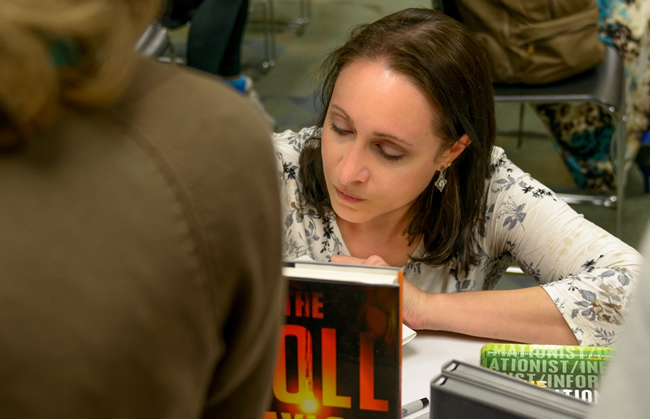
Stevens says she was interested in exploring family dysfunction, but “in thrillers, family is usually a plot device—a wife who’s been kidnapped, or a child to humanize the hero.”
So she wondered, “What would happen if you took the family dysfunction of mainstream fiction and layered it over a family of assassins in which everyone is quite capable of killing each other and often wants to? I was like, yes, I’ve got to do this.”
However, Stevens came across a major obstacle when she realized there’s a reason that family dynamics aren’t usually explored in thrillers.
“You can drop an Army Ranger into a book and everyone automatically gets that this is a guy who can make things go boom. He’s part of the story, but he’s not the story,” she says. “But you can’t do that with a couple of twenty-something nobodies who come out of nowhere with John Wick skills. They have a history that demands being told … but as fascinating as that character discovery may be, it’s not a thriller. Thrillers are action and a plot that keeps you reading late into the night, and it’s hard, really hard, to explore that history and the contentious, convoluted character dynamics while also maintaining a high-octane plot.”
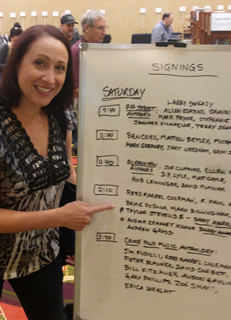
Hard, yes, but Stevens nails the “family thriller”—for lack of a better phrase.
She says it took several false starts to get it right—without sacrificing character development to plot, or vice versa. The smooth melding of showing who Jack, Jill, and their mother Clare really are—alone and together—with high-action bears the mark of an expert.
Jack is the calm, reasoned twin—perfectly capable of action, but wanting a plan first. Jill is just as smart and deadly, but she’s wild. As Stevens says, “I don’t think Jill always knows why she does what she does.” And while they both have cut ties to their mother, they come when she calls—fighting the entire way, physically and verbally. “It makes for a rather awesome sibling rivalry where you don’t know if they want to hug each other or kill each other,” she adds.
“Jack and Jill as characters actually started as a one-second flash idea that popped into my head years ago, not as siblings but as a young married couple in which the stereotypes were exaggerated and reversed—essentially a giant of a man who was bookish, intellectual, and philosophical, partnered with a tiny spitfire of a woman who was the impulsive, testosterone, guns, and muscle type,” Stevens says.
“But I’d never had a story that could do justice to characters like that, so they just stayed out there somewhere in the mental ether. When I started on LIARS’ PARADOX and realized I’d be working with siblings, that couple was the first thing that came to mind. So I started with the reverse stereotypes and the characters kind of developed from there. But, truthfully, I’m still figuring them out as I go.”
Fortunately, there’s a sequel on the way.
Stevens’s own complex and unusual background can be gleaned from reading her first book, and articles that have been written about her (like in Vogue)—she could literally star in her own novel. She’s refreshingly blunt and straightforward about her past on her website, and links to a variety of articles about her or that she’s written that talk about being raised in a cult.
“My childhood and adolescence were spent begging on city streets from Zurich to Tokyo, preparing food and washing laundry for hundreds of people, and otherwise trying to survive dreary life as a worker-bee child in a communal apocalyptic cult,” she says.
She brought some of her experiences with her into her books, but like most great thrillers, Stevens took her knowledge and understanding of human nature and parlayed that into a great read.
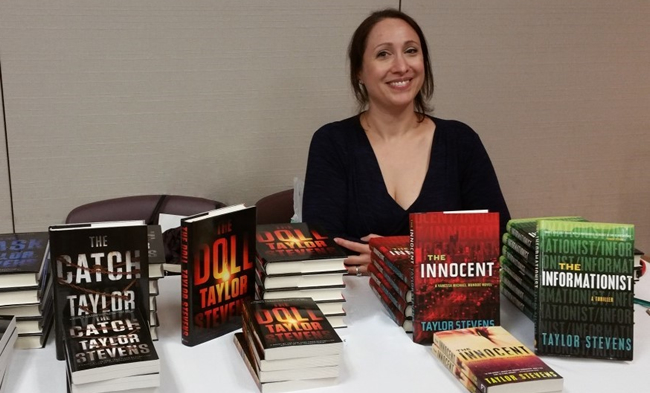
LIARS’ PARADOX (temporarily) transitions Stevens away from her Vanessa Munroe series, a process she calls “terrifying.”
“No book has ever been easy for me to write,” she says. “There has always been a point where I feel I’ve taken on more than I can handle and truly just want to admit defeat and quit. Sometimes that point lasts for months on end. But with Munroe I’d at least gotten comfortable with her as a character. It took six books, but I finally understood her inner world and knew how she thought and how she’d react and all of a sudden, my one safety net was just. . . gone. But it’s also been exciting. LIARS’ PARADOX is so different—not only from what I’ve written before, but from everything else that’s available right now. It moves so fast and introduces some truly unique characters, and I’m kind of holding my breath hoping everyone else finds it as entertaining as I do.”
LIARS’ PARADOX is my favorite book this year. And so I flat-out asked her if she wrote herself into the novel as one of the characters.
“Oh yeah, all the badass fighting, the strategic and tactical planning, the complex problem solving—I mean the whole package—all three packages—they’re just poorly disguised versions of me,” she says, joking. “This innocent, bumbling, harried, brain-fried working mom thing I’ve got going on here is just an act. In fact, I’ve perfected it so well over the years nobody even sees the real me anymore, so being able to bring these characters to life is kind of liberating in a way.”
Yes, she’s even funny.
Research is crucial for most writers in the genre, and I always like hearing how other writers do it. So I asked, “Your book has so many layers and a seemingly intuitive understanding of international conflict and spy games. How much is based on your own experience of growing up around the world, and how much is based on research? Did you interview any really cool people who actually lived the life, read any good research books, or did you just make everything up?”
Her answer really resonates.
“There are two aspects to this that dovetail in a way that’s nearly impossible to separate,” Stevens says. “The first is life experience. I did grow up in a lot of countries, but no matter where we lived, we lived in communes. This cloistered life meant that my interaction in any given environment was quite limited. I rarely knew the address of where we lived, was never allowed to freely roam, never had friends outside the commune, and the experiences I did have outside the communes, even as a child, usually involved approaching a lot of strangers for food and money. What this provided was an appreciation for the way culture affects everything, and as a storyteller, this helps me bring a situation or subject to life, even if I haven’t personally experienced it, because I understand the way strong, quick visuals can make it feel as if you’re living in a place even if you’re kind of not.
“The second is the actual research that goes into finding those visual elements. I read a lot—mostly online articles and news. My brain loves learning new things just about more than anything else in the world, but it’s also quickly and easily bored and distracted. Because of that, there’s this kind of constant knowledge flow dripping into my head that accumulates over time. When a story begins to take shape—for example I realize it’s going to involve espionage, or the Cold War, or a particular country—there’s usually already some kind of knowledge base to build on, and from there I tend to gravitate more specifically in that direction, which adds to it and makes it easier to realize what’s missing, and go hunting for the key images and details that would provide a sense of depth. My goal is never to become an expert—it’s to understand the mindset and culture just enough to avoid the stuff everyone argues about, and then write about it in a way that if an expert read it, they wouldn’t die laughing.”
At present, Stevens is working on the next Jack and Jill thriller, and shares that her writing process continues to evolve.
“When I wrote The Informationist, the book that launched me into the writing life, I really had no idea what I was doing,” she says. “I’d read very little fiction up to that point and so I didn’t even have a concept of what genre was. I had no characters, no plot, no story, no nothing—just this way off-the-map country I’d lived in that I wanted to bring to life. By chance, most of what I had read had been thrillers or mysteries so that’s what I understood fiction as—exciting stuff. When I started, it was just with the location and the understanding that there would need to be amazing characters and lots of oh-my-god-what-happens-next? It took about three years to write that first book, partly because I was learning how to write as I did it, but partly because I had no idea what the story was and was figuring it out as I went along.”
Like many writers, Stevens thought her first book was a fluke, and she didn’t know if she’d be able to write a second.
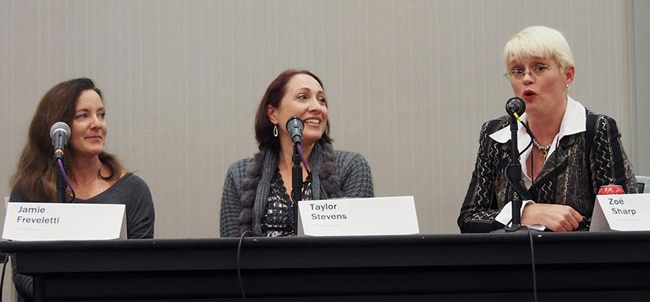
“I wasn’t even sure at that time how I managed to write the first one,” she says. “But between writing that first one and the time it sold, I’d gotten divorced and we were in the worst recession in recent history. The house had gone to me and the kids, but I had no job, and since I’d been home with the kids all those years, as far as my resume was concerned, I had no education, no job history, no nothing. I was desperate and panicked with no idea how I was going to keep the roof over our heads. The day I got the call that the book had sold, I was at the lowest point of my adult life. I was drowning and someone had hauled me out of the water and breathed air back into my lungs.”
Stevens says her agent suggested she write an “outline” to start the second book, but having never written one before, she didn’t even know where to begin.
“I didn’t really even understand what an outline was and the thought of having to do this thing for a story I hadn’t even thought about yet was so overwhelming I figured it’d be easier to just write the whole book,” she says. “But I didn’t know if I could do that either. I was so incredibly broke and I needed the money so bad, and I was terrified of having to give any of it back, so I basically sat down at the computer and told myself the entire story. Which is how I learned what an outline was, and how I learned that outlining a book and then writing takes way less time than pantsing does, which for me is a big deal because I’m not a fast writer and I can’t afford to take three years to write each book.”
And clearly, Stevens’s fans don’t want her to take three years, either.
“These stories are incredibly complex in terms of plot and how all the moving pieces fit together. So that’s where my plotting focus goes,” she says. “It’s kind of like a skeleton, where I know what the story is going to look like more or less. But all the rest of it, the character development and dialogue and the little things that bring it to life, that’s all pantsed along the way.”
So, what’s the one thing she wishes she could fix about her writing process?
“My almost OCD-like obsession with cadence and the words on the page—essentially, the writing quality,” she says. “There’s a point where trying to make it better is just wasted time. I’m not writing literary fiction, I’m writing thrillers, and most people who read thrillers just want a really good story. If I could stop reworking the same sentences a hundred times—which is my OCD equivalent of opening and shutting a door until it has the right click sound—the whole process would move a lot faster and I’d spend less time in the muddle feeling like I’ve finally found a story I’m not smart enough to write.”
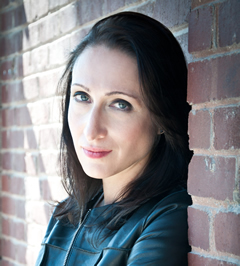
All authors want to write the next book better than the last, but there comes a point where they think, “I just can’t do it. I’m just not good enough.” So aspiring writers take note: every author goes through these moments of creative despair, and it doesn’t matter if you’ve written one book or ten or 30.
“I’m not naturally a creative person,” Stevens says. “I’m a bean counter. I’d rather do taxes than have to build a story’s first draft. Ideas don’t come easily to me, they have to be nurtured and grown and coaxed into story form and it’s an excruciating process—psychologically, emotionally, even sometimes physically painful. But, once that first draft is finished, the bean counter part of my brain really enjoys transforming it from crap to something readable.”
Stevens’s book isn’t just readable; it’s—in my own words—“hands-down the best thriller I’ve read this year. Original, cunning, smart, riveting, and relentless; with complex characters, pitch-perfect pacing, and high tension from page one to the end that begs for a movie treatment. Taylor Stevens has catapulted herself to the top of my favorite authors, right up there with Lisa Gardner and Lee Child.”
*****
Taylor Stevens is the award-winning, New York Times bestselling author of the critically acclaimed Vanessa Michael Munroe series. Published in over twenty languages and optioned for film by James Cameron’s production company, Lightstorm Entertainment, the books are international boots-on-the-ground thrillers featuring a mercenary information hunter in a non-testosterone mix of Jason Bourne and Jack Reacher. Stevens came to writing fiction late. Born into an apocalyptic cult and raised in communes across the globe, she was denied an education beyond 6th grade and spent her adolescence as child labor. Stevens now calls Dallas home. In addition to writing novels, she shares extensively about the mechanics of storytelling, writing, overcoming adversity, and her journey into publishing on her website – she welcomes you to join her.
Allison Brennan is the New York Times and USA Today bestselling author of more than 30 books. Allison believes that life is too short to be bored, so she writes three books a year and is raising five children. She’s currently writing the Lucy Kincaid FBI series and the Maxine Revere cold case mystery series.
To learn more about Allison and her work, please visit her website.


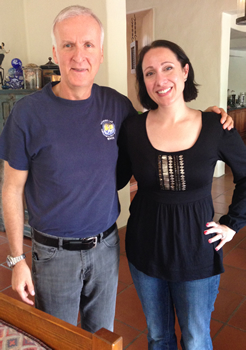
One Response